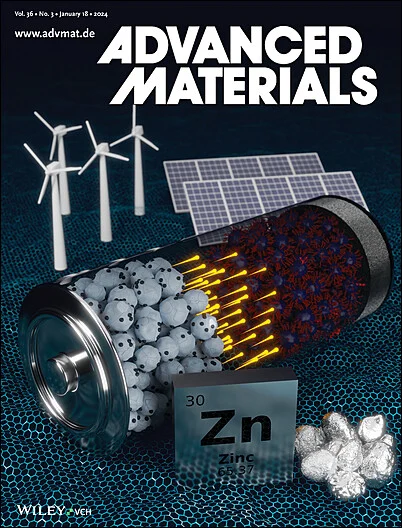Cell Surface-Confined DNAzyme Coordination-Facilitated Logical Engineering for Precise Cell Identification
IF 27.4
1区 材料科学
Q1 CHEMISTRY, MULTIDISCIPLINARY
引用次数: 0
Abstract
DNA logical processing, which employs DNA as a building block to perform logic operations, attracts considerable attention in biomedical applications. Herein, a new DNA logical processing strategy is explored for selective cell engineering and to develop a feasible technology for precise cell identification. Specifically, this cell identification technology accomplishes logical engineering through the employment of cell surface-confined DNAzyme coordination, which not only enables the labeling of versatile DNA probes at specific cells but also avoids false-positive outputs caused by the neighboring non-target cells. In proof-of-principle studies, this cell identification technology achieves precise magnetic isolation and electrochemical determination of specific cancer cells (i.e., stem cell-like subpopulations in breast cancer). When further applied to tumors taken from mouse models, this technology exhibits accuracy comparable to that of flow cytometry; however, it is simple to operate and offers superior recognition capabilities for revealing multiple biomarkers. More importantly, this cell identification technology can be successfully applied in tumor tissues from breast cancer and lung cancer patients, demonstrating satisfactory practicability. Therefore, this work may provide new insights for the precise identification of cells, especially cancer cells, and is expected to offer technical support for clinical diagnosis and related biomedical research.

细胞表面受限DNAzyme协调-促进精确细胞鉴定的逻辑工程
DNA逻辑处理是一种利用DNA作为构建块进行逻辑运算的方法,在生物医学应用中引起了广泛的关注。在此,我们探索了一种新的DNA逻辑处理策略,用于选择性细胞工程和开发一种可行的精确细胞鉴定技术。具体来说,这种细胞鉴定技术通过使用细胞表面限制的DNAzyme配合来完成逻辑工程,不仅可以在特定细胞上标记通用DNA探针,还可以避免邻近非靶细胞引起的假阳性输出。在原理验证研究中,这种细胞鉴定技术实现了对特定癌细胞(即乳腺癌中的干细胞样亚群)的精确磁隔离和电化学测定。当进一步应用于取自小鼠模型的肿瘤时,该技术显示出与流式细胞术相当的准确性;然而,它操作简单,为揭示多种生物标志物提供了卓越的识别能力。更重要的是,该细胞鉴定技术能够成功应用于乳腺癌和肺癌患者的肿瘤组织中,显示出令人满意的实用性。因此,这项工作可能为细胞特别是癌细胞的精确鉴定提供新的见解,并有望为临床诊断和相关生物医学研究提供技术支持。
本文章由计算机程序翻译,如有差异,请以英文原文为准。
求助全文
约1分钟内获得全文
求助全文
来源期刊

Advanced Materials
工程技术-材料科学:综合
CiteScore
43.00
自引率
4.10%
发文量
2182
审稿时长
2 months
期刊介绍:
Advanced Materials, one of the world's most prestigious journals and the foundation of the Advanced portfolio, is the home of choice for best-in-class materials science for more than 30 years. Following this fast-growing and interdisciplinary field, we are considering and publishing the most important discoveries on any and all materials from materials scientists, chemists, physicists, engineers as well as health and life scientists and bringing you the latest results and trends in modern materials-related research every week.
 求助内容:
求助内容: 应助结果提醒方式:
应助结果提醒方式:


